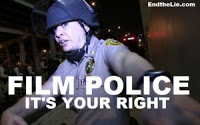Madison Ruppert, Contributing Writer
Activist Post
In a major victory for Americans who value liberty and the First Amendment, a Cook County, Illinois judge ruled that the state’s highly controversial eavesdropping law is unconstitutional.
The law made the simple act of recording a police officer without their consent, even during the course of their public duties, a felony offense.
Judge Stanley Sacks declared that the eavesdropping law is unconstitutional on the grounds that it has the potential to criminalize what would otherwise be “wholly innocent conduct.”
I couldn’t agree more, and it’s great to see that there are, in fact, some sane individuals still working in the American justice system.
I’ve been incredibly disillusioned by cases like that of Thomas Arthur and the wildly inconsistent prosecution of criminal acts, but this gave me a much-needed boost of hope.
The eavesdropping law, in principle, doesn’t seem like all that bad of an idea. After all, it is supposedly there to protect peoples’ private conversations from being recorded without their permission.
However, the way in which it was utilized was a different matter entirely.
Using this law to punish people for recording their interactions with police is patently absurd. The police are public servants carrying out public duties in public places, all funded by the taxpayer.
As a taxpayer, why shouldn’t you have a right to film your employee carrying out their public duties in a public area? It simply makes no sense.
The application of this law to encounters with police is based on the clearly erroneous idea that police have a reasonable expectation of privacy while performing said public duties.
If this was a case of an off-duty police officer being recorded in a private residence, or other location in which they obviously had a reasonable expectation of privacy and were not engaging in public duties and therefore not being paid by the taxpayer, I would think that the application is fair.
Of course, that is far from how this law was applied in the case of Christopher Drew.
Drew is an artist who was arrested back in December of 2009 for selling art without a permit. After it was discovered that he had an audio recorder in his pocket capturing his conversations with the police officers, he was charged with a felony violation of Illinois’ eavesdropping law.
While the story at the Chicago Tribune ends there, some additional details can be found via Kevin Gosztola of FireDogLake.
“Drew, who has a history of challenging the city’s restrictions on the selling of art, was peddling silk-screened patches for $1 in an act of civil disobedience. A First Amendment lawyer and a team of photographers filmed his arrest,” Gozstola reports. “A First Amendment lawyer and a team of photographers filmed his arrest. The police let the filming go, and Drew was arrested. When it was time for Drew to face his charges, he found out he had been given a Class 1 felony charge for violating the Illinois Eavesdropping Act and filming his arrest. This meant he faced a possible sentence of fifteen years in prison.”
 Gozstola reinforces my earlier point in highlighting the fact that Chicago police have leveraged the eavesdropping law not to protect the privacy of regular people, but instead as a nice way to avoid lawsuits for the abuses police might carry out while on duty.
Gozstola reinforces my earlier point in highlighting the fact that Chicago police have leveraged the eavesdropping law not to protect the privacy of regular people, but instead as a nice way to avoid lawsuits for the abuses police might carry out while on duty.
Gosztola cites an example from an Occupy Chicago demonstration as proof of this activity, “In the final days of January, Occupy Chicago was out protesting in the city when a police officer took a camera from someone who was live streaming the action and deleted the video. He told the live streamer, Keilah, that she could have been charged with a felony.”
In his article he says that while police may continue to try to arrest demonstrators under the eavesdropping law in order to avoid being filmed, any charges brought under the law are unlikely to hold up.
This is a huge step forward not only for what is commonly referred to as “citizen journalism” but also for those brave individuals who are on the front lines of protests across the country and recording police misconduct.
Furthermore, it is an even greater blow to the dualistic justice system which treats everyday Americans completely differently than an on duty police officer.
This will help keep police in Illinois accountable, especially during the upcoming protests focusing on the G8 and NATO summits. However, there have been some disturbingly draconian laws (not to mention the so-called “Trespass Bill”) put in place that might outweigh whatever benefits this latest ruling might have.
That being said, I don’t think that these facts diminish from the power that this decision could have on the future of the American police state.
This article first appeared at EndtheLie.com. Read other contributed articles by Madison Ruppert here.
Madison Ruppert is the Editor and Owner-Operator of the alternative news and analysis database End The Lie and has no affiliation with any NGO, political party, economic school, or other organization/cause. He is available for podcast and radio interviews. Madison also now has his own radio show on Orion Talk Radio from 8 pm — 10 pm Pacific, which you can find HERE. If you have questions, comments, or corrections feel free to contact him at [email protected]
linkwithin_text=’Related Articles:’



Be the first to comment on "A blow to the police state: Judge rules Illinois eavesdropping law unconstitutional"